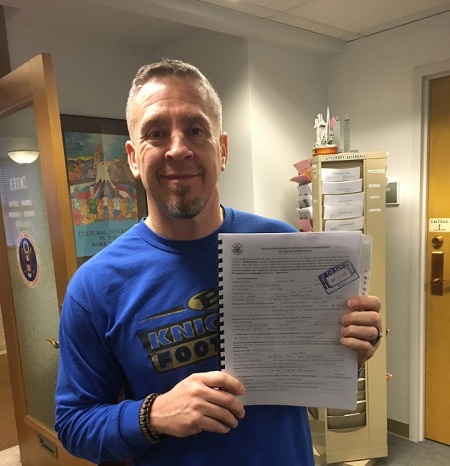Supreme Court won't hear appeal of football coach fired for praying after games

The United States Supreme Court decided Tuesday not to hear an appeal from a public high school football coach who was fired for kneeling in prayer on the field after games.
Joe Kennedy, who coached at Bremerton High School in Washington state before he was suspended in 2015, had his appeal to the high court denied Tuesday.
Supreme Court Justice Samuel Alito issued a statement concurring with the denial as part of the order, being joined by Justices Clarence Thomas, Neil Gorsuch, and Brett Kavanaugh.
In his statement, Justice Alito explained that the denial came not because of agreement with a lower court ruling but rather a belief that there remained “important unresolved factual questions.”
“… although petitioner’s free speech claim may ultimately implicate important constitutional issues, we cannot reach those issues until the factual question of the likely reason for the school district’s conduct is resolved. For that reason, review of petitioner’s free speech claim is not warranted at this time,” wrote Alito.
Kelly Shackelford, president of First Liberty, the firm representing Kennedy, said in a statement on Tuesday that they did not see the rejection as an end to the case.
“We are eager to return to the district court, answer the questions the justices raised today, and give the court another opportunity to protect the right of every American to engage in private religious expression, including praying in public, without fear of getting fired,” said Shackelford.
Americans United for Separation of Church and State, which filed an amicus brief on behalf of the school district, expressed support for the Supreme Court’s decision to not hear arguments.
“The coach’s actions were a clear violation of religious freedom, forcing kids to choose between their own beliefs and appeasing the man who decides the lineup for the game,” said Americans United President Rachel Laser in a statement released Tuesday.
“Luckily, the school district recognized and put a stop to this coercive act, sending the clear message that the beliefs of all students must be respected. The Supreme Court’s action today signals that the school district had the right to protect the religious freedom of its students.”
According to court documents, Kennedy began his prayer tradition of kneeling on the 50-yard line at the end of football games in 2008. Though he waited until everyone was off the field to pray silently, he was often joined by members of his team.
In September 2015, Bremerton School District Superintendent Aaron Leavell sent a letter to Kennedy telling him that the prayers violated the Establishment Clause. When Kennedy refused to halt his practice, he was placed on administrative leave in October 2015 and eventually suspended.
Kennedy filed a complaint in December 2015 with the Equal Employment Opportunity Commission against the school district, with the Commission granting him a right-to-sue.
In June 2016, Kennedy filed a lawsuit against the school district only to have U.S. District Judge Ronald B. Leighton reject the coach's request for an injunction in September 2016.
In August 2017, a three-judge panel of the U.S. Court of Appeals for the Ninth Circuit affirmed the ruling, with Judge Milan D. Smith Jr. authoring the panel's opinion.
"We conclude that Kennedy spoke as a public employee, not as a private citizen, and therefore decline to reach whether BSD justifiably restricted Kennedy's speech to avoid violating the Establishment Clause," wrote Smith.
"Kennedy accordingly cannot show a likelihood of success on the merits of his First Amendment retaliation claim, and is not entitled to the preliminary injunction he seeks."
Last January, an appeal to hold arguments before the entire Ninth Circuit was rejected, prompting Kennedy to file an appeal with the Supreme Court.
Several amicus briefs were filed on behalf of Kennedy, including ones from the Billy Graham Evangelistic Association, 12 attorneys general, famed college football coach Bobby Bowden, and 15 members of Congress.
"Kennedy's conduct does not implicate any valid Establishment Clause concerns," read the Congressmen's friend-of-the-court brief.
"It is undisputed that Kennedy did not encourage or even invite players to join him in prayer, as the only students who participated were those who voluntarily joined Kennedy.





















